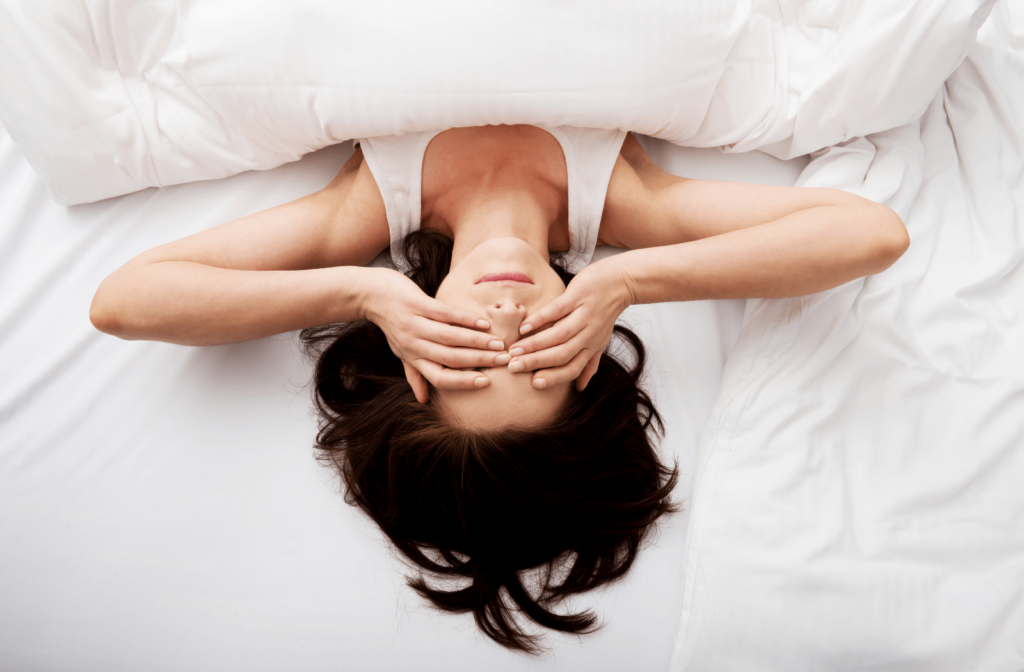Dry eyes can make daily living difficult. Reading, working, and even driving can feel impossible.
While certain home remedies help, it’s essential to know the difference between acute dry eye symptoms and chronic Dry Eye Syndrome, the latter of which can be caused by underlying health issues. We’re here to help figure it out.
What Is Dry Eye Syndrome?
Dry Eye Syndrome is a common eye condition that causes your eyes to feel uncomfortable and irritated. Usually, this is because your eyes don’t produce enough tears or your eyes produce poor-quality tears. It can impact your ability to function day-to-day if left untreated.
Signs & Symptoms
The common signs and symptoms of dry eye include:
- Blurry vision
- Watery eyes
- Light sensitivity
- Eye fatigue/redness
- Difficulty driving at night
- Difficulty wearing contacts
- Stringy mucus in/around eyes
- Stinging, burning, or scratching sensation
Causes
Dry eye can be caused by several factors, such as:
- Aging
- Allergies
- Eyelid issues
- Hormone changes
- Certain medications
- Not blinking enough
- Vitamin A deficiency
- Wind, smoke, or dry air
- Previous eye injury/surgery
- Decreased tear production
- Increased tear evaporation
- Certain diseases/conditions
While dry eye may start as a simple nuisance, it can create long-term issues for anyone experiencing it.
Do I Have Dry Eye Syndrome?
Waking up with dry eyes doesn’t necessarily mean you have dry eye syndrome. However, it’s important to know your symptoms and book an appointment with your eye doctor to get the proper diagnosis and treatment.
Read on to learn some of the common causes of dry eye.
Tear Quality
The tear film has three layers; aqueous fluid, mucus, and fatty oils. This combination is supposed to keep the eye’s surface lubricated, smooth, and clear. If internal or external factors impact this film, you may experience dry eye symptoms.
The aqueous fluid (water) layer hydrates the eyes. The mucus layer spreads the tears evenly across the eye’s surface. The oil layer prevents the water layer from evaporating too quickly.
If any of these layers lack volume, tear quality can drop and lead to conditions like dry eye.
Insufficient Tear Production
There are glands around the eyelids that work together to produce tears. If your eyes aren’t producing enough tears, it could lead to dry eye disease. Some reasons for this could be:
- Age (people who are 65+ are at higher risk)
- Certain medical conditions: Sjogren’s Syndrome, Rosacea, Rheumatoid Arthritis
- Side effects from medication (antihistamines, antidepressants, etc.)
- Environmental conditions like allergens, dust, smoke, and low humidity
Thyroid Dysfunction
Hyperthyroidism can affect your ability to fully close your eyes when blinking, leading to a poorly hydrated ocular surface. This can especially cause problems while sleeping, leaving parts of your eye exposed to the air for hours at a time overnight, leading to significant dry eye symptoms when you wake up.
Hypothyroidism can impact your body’s ability to produce a sufficient amount of tears. Low tear production, or poor tear film quality, can lead to dry, gritty sensations especially when you blink. This can make your eyes progressively worse throughout the day.
Talk to your doctor if you have a thyroid-related condition and experience dry eye symptoms.
Medications
Both prescription and over-the-counter medications can cause dry eyes. Mainly, these medications include:
- Antihistamines & decongestants
- Acne medications (ex: Accutane)
- Antidepressants (SSRI, TCA)
- Birth Control & Hormone Replacement Therapy
- High Blood Pressure medications
- Heartburn & Stomach Acid blockers
Screen Time
Excessive computer use can lead to dry eye over time. Studies show that when we stare at a screen, we blink about half as much as we should. As a result, your tears evaporate to a greater degree, leading to more friction when blinking, gritty eyes, burning/stinging sensations, more visual fatigue, and poor visual performance.
Use the 20-20-20 rule. Every 20 minutes, take a 20-second break and stare at something 20 feet or further away. You can also keep artificial tears on you if you spend a lot of time on a screen at work.
Vitamin A Deficiency
Vitamin A is critical to healthy eyes. A lack of vitamin A can affect how your eyes produce tears, leading to severe dry eyes and a condition known as Bitot’s Spots. To prevent vitamin A deficiency, or to help address it, include these foods in your diet:
- Beef liver (this is the best-known source of bioavailable vitamin A)
- Egg yolks
- Cod Liver Oil
- Dairy
- Vegetables like carrots & bell peppers contain beta-carotene, which is a precursor to vitamin A, which can be converted to vitamin A in small amounts, much less efficiently than animal-based sources
Autoimmune Conditions
Certain autoimmune conditions can cause dry eye symptoms, such as:
Talk to your doctor about your dry eye symptoms to properly determine if they’re related to another condition.
Allergies
Allergies can make your eyes feel dry and itchy, but can also lead to dry eye syndrome. Seasonal allergens can enter your home through open windows and doors, vents, and air conditioning units.
Anti-allergy eye drops can help alleviate your symptoms and are sometimes used in combination with lubricant eye drops. In Canada, clinical-strength antihistamine eye drops are prescription-only, which you can get through your optometrist.
Dehydration
You may be experiencing dry eye symptoms due to not drinking enough water. You should drink 3 to 4 litres daily to keep your body hydrated. When you sweat you also lose electrolytes, and people on a low-sodium diet for high blood pressure are more at risk of dehydration.
Home Remedies
You can try treating your dry eye symptoms at home with some easy remedies, including:
- Warm compress: apply a warm compress (i.e. using a TheraPearle mask or i-Relief Mask, both available over-the-counter at Orchard Park Optometry) over your closed eyes to help unclog Meibomian glands in the eyelids
- Washing your eyelids: we recommend the i-Lid-n-Lash wipes or Hypochlor Face & Lid Spray to scrub your eyelids gently to clean away dirt, debris, dry skin, & dried mucus from the skin/lashes
- Use a humidifier: add a humidifier to your home to keep the air moist
- Drink water: it’s important to stay hydrated throughout the day, especially during these hot summer months
- Use 20-20-20: take a break every 20 minutes for 20 seconds & stare at something 20 feet or further away
- Wraparound eyewear: protective eyewear, like wraparound sunglasses, can protect your eyes from sun, wind, & dust when outside
- Use an air filter: air filters can help cleanse the air in your home from allergens, pet dander, & pathogenic microbes (bacteria, viruses, fungi)
When To See a Doctor
There are a variety of treatments available to treat dry eye. If you experience ongoing or worsening symptoms, book an appointment with our office today! We can help you find relief.





